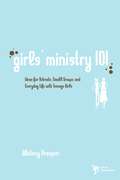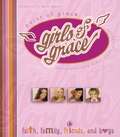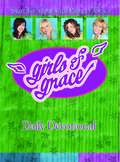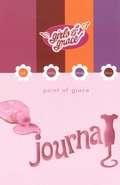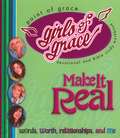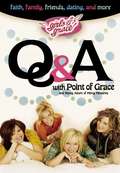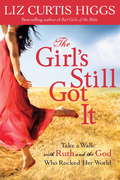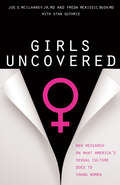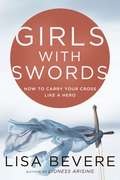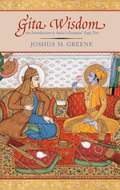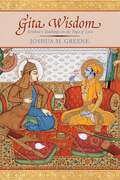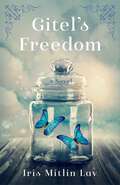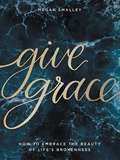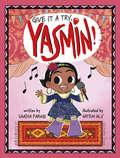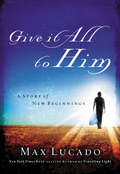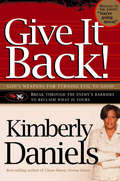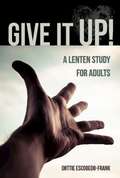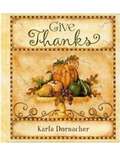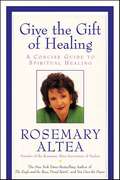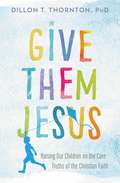- Table View
- List View
Girls' Ministry 101: Ideas for Retreats, Small Groups, and Everyday Life with Teenage Girls
by Whitney ProsperiFor Girls Only! Fact #1–Chances are that girls make up half or more of your youth group. Fact #2–Ministering to girls presents unique challenges and opportunities. Fact #3–Because of facts #1 and 2, you need Girls’ Ministry 101. This handbook on meeting your girls’ all-important spiritual needs will take you from zero to full speed as you: • Discover secrets of building relationships with teenage girls. • Explore your girls’ worlds. • Recruit and empower volunteers. • Create opportunities for young women to grow. Packed with insights and wisdom from youth ministers experienced in working with teenage girls, Girls’ Ministry 101 also offers ideas for finding and training the right woman for the job, events and retreats, questions to spark conversation, and much, much more. Whether you’re a man or a woman, a vet or a volunteer, Girls’ Ministry 101 will provide you with the tools to make sure that the love of Christ is effectively conveyed to the girls in your group.
Girls of Grace
by Point Of GracePoint Of Grace launches a new book and tour of the same title to give direction and hope to the next generation of young women. This unique book, designed to help young women grow in their Christian walk, offers practical teaching, personal stories, and biblical insight into the issues that mean the most to teenage girls: faith, family, friends, and boys. Each chapter includes a message from one of the four members of Point Of Grace, a key Scripture, and a special study guide to help teenage girls to learn to find real answers to real-life problems in the Bible. As an added feature, each of the four sections includes fun "outer-beauty tips" and faith-growing "inner-beauty tips." In this important book, Shelley, Heather, Denise, and Terry use their unique position to minister to young women during the difficult teen years. Fun, personal, spiritual, and challenging are just a few of the words that describe this exceptional book. One of the most dynamic forces in contemporary Christian music, Point of Grace boldly reveals their deep concern and devotion to the next generation of young women by launching this tour and writing this book to inspire their millions of admirers.
Girls of Grace Daily Devotional
by Howard BooksStart Your Day Off Right This made-just-for-you devotional from Point of Grace is the perfect way to make sure you are centered on God and ready for whatever your day brings. Each week is set up so you can pick and choose the activity you want to do each day in whatever order you choose. Here's how it works: There are fifty-two topics (one for each week of the year), and each one has five short and easy devotions. Each week has a brief message a fill-in-the-blank Bible study a special scripture for you to read and place in your heart an action idea for living out that week's message some space to journal your thoughts and feelings The five-devotions-a-week plan allows for a rest on Sunday and one "Yikes! I overslept" day. By the end of each week, you'll be closer to God, deeper into His Word, and more like Jesus.
Girls of Grace Daily Devotional
by Point Of GraceStart Your Day Off Right This made-just-for-you devotional from Point of Grace is the perfect way to make sure you are centered on God and ready for whatever your day brings. Each week is set up so you can pick and choose the activity you want to do each day in whatever order you choose. Here's how it works: There are fifty-two topics (one for each week of the year), and each one has five short and easy devotions. Each week has a brief message a fill-in-the-blank Bible study a special scripture for you to read and place in your heart an action idea for living out that week's message some space to journal your thoughts and feelings The five-devotions-a-week plan allows for a rest on Sunday and one "Yikes! I overslept" day. By the end of each week, you'll be closer to God, deeper into His Word, and more like Jesus.
Girls of Grace Journal
by Point Of GraceThis companion journal to the Girls Of Grace book will help teenage girls write about their day and chronicle their thoughts and feeling about faith, family, friends, and boys. The journal is designed to prompt writings on everyday occurrences, prayers, spiritual growth, fun memories, dreams, struggles, and victories. Journaling with a purpose is a fun, practical aid to maturity and growth.
Girls of Grace Make it Real
by Point Of GraceThe Girls of Grace conferences have inspired thousands of young women across the globe. Now, Make It Real, based on the 2005-2006 Girls of Grace conference theme, inspires each and every girl to see herself through God's eyes and be the person He wants her to be. Point of Grace is: Shelley, Denise, Leigh, and Heather. Together in this fun, biblically-based book, the girls discuss and apply the issues facing young women today: Words, Worth, Relationships, and Me. If you enjoy their conferences or their music, you're sure to love this book as they encourage all young girls to Make It Real!
Girls of Grace Q & A
by Point Of GraceIn each Girls of Grace conference, the members of the popular Christian group Point of Grace deal with the hot topics facing young women today. Denise, Heather, Shelley and Leigh, along with their friend and director of Mercy Ministries, Nancy Alcorn, openly talk about family, sex, dating, friendships, and more. Blending their own insights with biblical instruction, they offer a fresh, contemporary style and helpful advice and encouragement.
The Girl's Still Got It: Take a Walk with Ruth and the God Who Rocked Her World
by Liz Curtis HiggsYou know Ruth's story. Now meet her in person. And prepare to be changed. Walk with Ruth as she travels from Moab to Bethlehem, certain of her calling, yet uncertain of her future. Hold Naomi's hand and watch love put the pieces of her broken life back together. And hang out with Boaz, their kinsman-redeemer, who blesses both women and honors God, big time. With best-selling author Liz Curtis Higgs by your side, you'll tarry in the corners of their ancient houses, listen to their conversations, and consider every word of every verse until you can say, "I totally get the book of Ruth. And I see what God is trying to teach me through this rags-to-riches redemption story--he has a plan for my life." Girl, does he ever! Think of it as time travel without gimmicks, gizmos, or a DeLorean: a novel approach to Bible study that leaps from past to present, gleaning timeless truths that speak to the heart.
Girls Uncovered: New Research on What America's Sexual Culture Does to Young Women
by Joe S. McIlhaney, Jr., MD Freda McKissic BushAny parent can identify with the feeling that girls growing up in America face a treacherous future; Girls Uncovered unveils the facts.In a follow up to their eye-opening release Hooked, obstetricians Joe McIlhaney and Freda Bush present stunning scientific research on the development of young girls in America's increasingly reckless sexual culture. They survey the reality of prevalent sexual behaviors and attitudes as well as their psychological, social, physical, and spiritual effects. Despite the harrowing facts revealed by their studies, McIlhaney and Bush give us hope through their expertise as physicians and parents of daughters. Girls Uncovered provides fundamental wisdom and practical advice to help parents, counselors, and church leaders guide young girls safely through the challenges they will face so they can achieve their potential and enjoy full health, hope, and happiness.
Girls Uncovered: New Research on What America's Sexual Culture Does to Young Women
by Joe S. McIlhaney, Jr., MD Freda McKissic BushAny parent can identify with the feeling that girls growing up in America face a treacherous future; Girls Uncovered unveils the facts.In a follow up to their eye-opening release Hooked, obstetricians Joe McIlhaney and Freda Bush present stunning scientific research on the development of young girls in America's increasingly reckless sexual culture. They survey the reality of prevalent sexual behaviors and attitudes as well as their psychological, social, physical, and spiritual effects. Despite the harrowing facts revealed by their studies, McIlhaney and Bush give us hope through their expertise as physicians and parents of daughters. Girls Uncovered provides fundamental wisdom and practical advice to help parents, counselors, and church leaders guide young girls safely through the challenges they will face so they can achieve their potential and enjoy full health, hope, and happiness.
Girls with Swords: How to Carry Your Cross Like a Hero
by Lisa Bevere John BevereWhat if you discovered you have been entrusted with an invisible, invincible, and incorruptible weapon? Would you use it? Move beyond only study and begin to wield the Word of God! Read this book with fair warning: you are about to engage in a powerfully courageous life! --Christine Caine, author of Undaunted and cofounder of The A21 Campaign Girls with Swords is prophetic, biblical, instructive, insightful, and challenging! This is no sweet, girly pep talk. This is powerful stuff for both women and men. We're excited about this book and the potential impact for the church around the globe. --Judah and Chelsea Smith, pastors, The City Church, Kirkland, WA Lisa Bevere is one of God's most powerful voices for this time in our history. --Sheila Walsh, core speaker for Women of Faith As you read Girls with Swords, you'll be empowered to face your challenges with boldness and learn to live like a hero. --Robert and Debbie Morris, pastors, Gateway Church, Dallas-Ft. Worth "If you don't have a sword, sell your cloak and buy one!" --Jesus If there ever was a time for women to be armed, it's now. Yet the Word of God is a sword we often are more comfortable studying than wielding. It's time we give girls swords and watch them connect heaven to earth. Worldwide, women are the targets of prejudice, sex trafficking, abuse, and even gendercide. Lisa Bevere writes that these attacks say more about who women might be in the future than who they have been in the past. In Girls with Swords she explains a spiritual enemy is seeking to disarm women on every level. It's time women become the heroes God created them to be and stand--courageous, discerning, forgiving, and wise. Creatively forging the imagery of swords, the Word of God, and the Cross, Girls with Swords will teach you: * How to speak the language of heaven on earth * What it means to intercede * What it means to carry your cross * What it means to be discerning * How to disarm the enemy * Why women are the enemy's target--and why God needs them to be heroes It's time to take up your sword and be a hero.
Girlz Rock: Devotions for you (Faithgirlz)
by Kristi Holl Jennifer VogtlinIn this ninety-day devotional, devotions like "Who Am I?" help pave the spiritual walk of life, and the "Girl Talk" feature poses questions that really bring each message home. No matter how bad things get, you can always count on God. "Excellent for Homeschool Use"
Gita Press Aur Hindu Bharat Ka Nirman: गीता प्रेस और हिन्दू भारत का निर्माण
by Akshaya Mukulसाल 1920 के आरंभिक दशकों में ही व्यवसायी से आध्यात्मिक गुरु बने जयदयाल गोयन्दका और हनुमानप्रसाद पोद्दार नामक मारवाड़ियों ने गीता प्रेस की स्थापना और कल्याण पत्रिका के प्रकाशन की शुरुआत की। साल 2014 के आरंभ तक गीता प्रेस, गीता की तक़रीबन 7.2 करोड़, तुलसीदास की कृतियों की 7 करोड़ और पुराण तथा उपनिषद जैसे धर्मशास्त्रों की 1.9 करोड़ प्रतियां बेच चुका था। यहाँ तक कि अब जबकि उस जमाने की बाकी सभी धार्मिक, साहित्यिक या राजनैतिक पत्रिकाएं प्रेस अभिलेखागार की धूल खा रही हैं, गीता प्रेस से निकलने वाली पत्रिका कल्याण 2,00000 सर्कुलेशन के साथ बाज़ार में है। वहीं इसके अंग्रेजी समकक्ष कल्याण–कल्पतरु का सर्कुलेशन भी 1,00000 से अधिक है। गीता प्रेस ने कट्टर हिंदू राष्ट्रवाद की आवाज़ को बुलंद करने के लिए एक साम्राज्य स्थापित किया और एक लाभ-आधारित तथा निर्धारणीय धर्मनिष्ठा की कल्पना की। महात्मा गांधी समेत लगभग सभी प्रमुख आवाजों और नेताओं को गो हत्या, राष्ट्रभाषा के तौर पर हिंदी का समर्थन और हिंदुस्तानी का बहिष्कार, हिंदू कोड बिल, पाकिस्तान गठन, भारत के पंथनिरपेक्ष संविधान जैसे मुद्दों पर बोलने-लिखने को बाध्य कर दिया। कल्याण और कल्याण–कल्पतरुइस तरह के सभी मामलों पर हिंदू पक्ष का प्रवक्ता था। गीता प्रेस और इसके प्रकाशन द्वारा तैयार किये जा रहे विचारों ने हिंदू राजनैतिक चेतना और वास्तव में हिंदी जन दायरे को गढ़ने में अहम भूमिका निभाई। यह इतिहास हमें हिंदू दक्षिणपंथ की राजनैतिक सर्वश्रेष्ठता के उभार जैसे विवादित और जटिल विषय पर नई दृष्टि प्रदान करता है।आधुनिक भारत के इतिहास में सबसे प्रभावी प्रकाशन उद्यमों में से एक रहे गीता प्रेस पर किया गया यह शोध गीता प्रेस एंड द मेकिंग ऑफ़ हिंदू इंडिया एक मौलिक, पठनीय, और गहराई से किया गया अध्ययन है। विवेकहीन उद्यमियों, शातिर संपादकों, राष्ट्रवादी विचारकों और धार्मिक कट्टरपंथियों के रूप में असाधारण ढंग से चरित्रों का निरूपण करने वाला यह अध्ययन हमारे समय का अत्यावश्यक अध्ययन है।
Gita Wisdom
by Joshua GreeneThe Bhagavad Gita is one of the most revered texts of all time, but it's often impenetrable to the 21st-century seeker. In Gita Wisdom, Joshua Greene retells this timeless text in a completely new way, revealing that it is, in essence, a heart-to-heart talk between two friends about the meaning of life. As Krishna and his friend Arjuna reminisce on a battlefield known as Kurukshetra, readers learn that the two played together as children, were close as young men, and became family when Arjuna married Krishna's sister. In later life the men shared extraordinary adventures, including a journey to places outside the known universe. Like all great literature, the Gita explores the human condition: who we are, where we came from, and why we're here. With a helpful glossary that lists names, terms, and places, this accessible, enlightening retelling is the perfect introduction to the Gita's venerable wisdom.
Gita Wisdom: An Introduction to India's Essential Yoga Text
by Joshua M. GreeneA Simon & Schuster eBook. Simon & Schuster has a great book for every reader.
Gitabodh
by M. K. Gandhiઆશ્રમવાસીઓ માટે યરોડા જેલમાંથી ગાંધીજી દર અઠવાડિયે ગીતાના એક એક અધ્યાયનો સાર મોકલતા હતા. તેનો પ્રારંભ તેમણે 12મા અધ્યાયથી કર્યો.
Gitel's Freedom: A Novel
by Iris Mitlin LavFor fans of Georgia Hunter&’s We Were the Lucky Ones and Anita Abriel&’s The Light After the War comes a historical narrative about the lives of Jewish immigrants in the early twentieth century and one woman&’s journey through adversity toward personal freedom.At an early age, Gitel questions the expected roles of women in society and in Judaism. Born in Belorussia and brought to the US in 1911 as a child, she leads a life constrained by her religious Jewish parents. Forbidden from going to college and pushed into finding a husband, she marries Shmuel, an Orthodox Jewish pharmacist whose left-wing politics she admires. They plan to work together in a neighborhood pharmacy in Chicago—but when the Great Depression hits and their bank closes, their hopes are shattered. In the years that follow, Shmuel&’s questionable decisions, his poor health, and his bad luck plague their marriage and leave them constantly in financial distress. Gitel dreams of going back to school to become a teacher once their one daughter reaches high school, but an unexpected pregnancy quashes that aspiration as well. And when, later, a massive stroke leaves Shmuel disabled, Gitel is challenged to combine caring for him, being the breadwinner at a time when women face salary discrimination, and being present for their second daughter. Offering an illuminating look at Jewish immigrant life in early-1900s America, Gitel&’s Freedom is a compelling tale of women&’s resourcefulness and resilience in the face of limiting and often oppressive expectations.
Give Grace: How To Embrace the Beauty of Life's Brokenness
by Megan SmalleyAre you traveling through a difficult season? With journaling pages, discussion and reflection questions, inspiring stories, and colorful design throughout, Give Grace, written by Megan Smalley, provides you with a safe place to process the ups and downs of life and find new inspiration to trust God's plan as you rest in his unfailing love. Through her own journey with loss and hope, Megan is passionate about sharing the message of God's grace for our lives, whatever we are experiencing today. In Give Grace, she shares her painful experience with infertility, as well as heartfelt stories of encouragement and personal growth from her own life, in order to come alongside us in our own times of questioning and waiting.Give Grace will help you:Feel comfortable discussing the challenging timesGrow spiritually and reflect on deeper thoughtsIdentify the purpose behind your painGive Grace is also an ideal gift for anyone going through a challenging time to let them know that they are cared for, loved, and able to handle anything with God's grace. If you are traveling through a difficult season--however big or small--you will find comfort in the Scripture, stories, and reflections in this beautiful book.
Give It a Try, Yasmin! (Yasmin #17)
by Saadia FaruqiIn this fun collection of four new Yasmin stories, Yasmin tackles every challenge she faces with her head and her heart! Whether she’s helping to solve a recycling problem at school, trying to avoid a science fair fiasco, searching for a favorite lost book, or gathering her courage to join in the fun, Yasmin is always willing to give it a try!
Give It All to Him
by Max LucadoThis story, excerpted from Next Door Savior, will become the Easter giveaway book for churches next spring-in the vein of He Did This Just for You. In this story a woman gives her garbage of shame to the trashman; an old man hands over his heavy bag of regrets. Hundreds walk to the landfill and find it filled with trash. "Give it to me. Tomorrow. At the landfill. Will you bring it?" He rubs a moist smudge from her cheek with his thumb and stands. "Friday. The landfill." "You can't live with this," he explains. "You weren't made to." For individuals and churches, here is a beautiful story of a Savior who can take all our garbage on his shoulders-and amazingly, still stand! In addition to this story, Max explains in easy-to-understand language what Christ did for us and how to turn in our old baggage and exchange it for new life in him.
Give It Back!: God's Weapons for Turning Evil to Good
by Kimberly DanielsIt is time to understand spiritual warfare…from God’s vantage point. Many believers have become insensitive, numb, and virtually powerless to deal with the occult in the world today. But this is not going to stop demon-busting pastor Kim Daniels. In her loving yet confrontational style, she exposes the enemy’s infiltration and strategies to keep us spiritually “dumbeddown.” This primer on spiritual warfare is written with a military flare. Using her military training, she delivers a message that teaches believers to confront the devil and his demons in a great spiritual battle and come out victorious in God.
Give It Up!: A Lenten Study for Adults
by Dottie Escobedo-FrankThis Lenten study reflects on all the things that hold our attention, occupy our minds and monopolize our time, yet still isolate us from God and the world around us. Things like social media, phones, the noise of life, and focus on the external. Imagine taking on the challenge of giving up each of these for a week. During this seven-week study, Dottie Escobedo Frank takes the reader on a journey of self discovery, where he or she learns that the power of release brings great gain. The biggest gain is a stronger relationship with Christ. In the release, each person is freed to "give it up" in applause and praise for a life deeply lived in Christ. This thematic Bible study is designed to be used by individuals and small groups during the Lent 2015 season. In addition to the main content, each chapter offers questions for reflection and discussion, a brief prayer, and a focus for the week. The focus emerges from the chapter content and encourages readers to engage in a spiritual practice or do something specific that will help them grow in faith. On the whole, this thematic seasonal Bible study series is designed for transformation and application of Bible study to everyday, practical life experience.
Give Thanks
by Karla DornacherEvery moment invites opportunity to have a thankful heart. Beloved artist Karla Dornacher is at it again with fresh, new inspiration for recognizing all that we have to be thankful for, no matter the circumstance. Page after beautiful page, her warm, home-style artwork graced with gentle words of inspiration and vignettes about her life take on you a journey of faith and hope, and radiate new reasons to give thanks every day. Included are recipes, crafts, family traditions, journaling pages, Scriptures, and prayers. Give Thanks is a beautiful and unique way to stop and celebrate the art of being grateful for the simple treasures of life.
Give the Gift of Healing: A Concise Guide to Spiritual Healing
by Rosemary AlteaFrom The New York Times bestselling author of The Eagle and the Rose and Proud Spirit comes a book on spiritual healing.Rosemary Altea, the internationally renowned medium known to millions worldwide as "The Voice of the Spirit World," is also the founder of the Rosemary Altea Association of Healers, a charitable organization with patients worldwide. In this book package, Rosemary offers an introduction to spiritual healing, beginning with a personal account of how she embraced her role as a healer sixteen years ago. Sharing her belief that sickness and pain can cause the soul to live in a dark place, Rosemary presents healing techniques designed to give light - the Seven Steps to Self-Healing. We meet two inspiring patients who have been treated by Rosemary and her team of healers, and we learn how we can harness the power of our own thoughts and use color energy visualizations to achieve inner peace. Also included is a color chart explaining how each of eight vibrant hues can give us the gift of healing.
Give Them Jesus: Raising Our Children on the Core Truths of the Christian Faith
by Dillon T. ThorntonA fresh, clear, joyful guide for parents on how to teach their children to love God with all their heart, soul, mind, and strength.GIVE THEM JESUS aims to help parents not simply add to their children's stockpile of knowledge, but to cultivate children-disciples who are able to display Christ-likeness in every situation. Parents are the ones primarily responsible for opening up the Scriptures to help their children understand God, the world, and themselves. The family is the divinely appointed discipleship program; the home is first and foremost a place of worship. The introduction of the book discusses the four vital components of family worship: teach, treasure, sing, and pray, and offers practical suggestions for beginning and prioritizing family worship in the rough and tumble of life. Subsequent chapters guide parents to a deeper understanding of the core truths of the historic Christian faith, as summarized in the Apostles' Creed, arming them with appropriate language, helpful illustrations, and relevant object lessons, so that in the end they will be better prepared to pass these truths on to their children. Each chapter concludes with a family worship guide, which includes: 1) family memory verses, 2) nuggets of truth from the chapter, 3) questions for family discussion, 4) songs that celebrate the truths of the Creed, and 5) prayer prompts. GIVE THEM JESUS equips parents to prepare their children to leave home and go out into the world as faithful participants in the great gospel story. "Never stop telling the gospel story to your kids," Thornton says. "Give your children Jesus. Again. And again. And again. And you'll see them walk in the truth."
